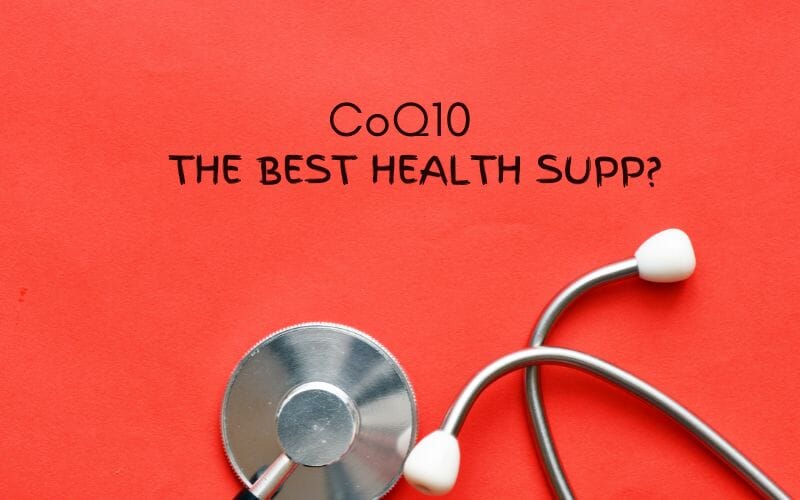CoQ10: The Antioxidant for Treating Heart Disease
As athletes, we are always searching for ways to push our bodies past their limits to achieve maximum gains. Sometimes that requires supplementing ingredients into our diet to get that much-needed boost. In some cases, that just means increasing the amount of a substance that’s already present. One of which is CoQ10, an organic chemical compound that offers a multitude of health benefits.
What is CoQ10?
Coenzyme Q10 (CoQ10) is a vitamin-like substance present everywhere in your body and is responsible for helping generate energy. The highest levels of CoQ10 are located in your heart, liver, kidneys, and pancreas. Although it’s more concentrated in the mitochondria (powerhouse) of the cell, it’s also present in the cell membrane. So, not only does it assist in the production of adenosine triphosphate (ATP), Coenzyme Q10 works to enhance the structure of the cell, reducing the chances of dangerous free radicals in the body.
As you age, the CoQ10 levels in your body start to decline. Those with heart disease or who take medicine to lower their cholesterol also tend to see a drop in production [1]. While CoQ10 is found in meats, fish, and nuts, it’s not enough to significantly affect the levels in your body. Coenzyme Q10 is a great nutrient with various advantages and that’s why it’s becoming increasingly more popular for people to supplement it in their daily life.
Ubiquinone vs. Ubiquinol: What’s the Difference?
There are two true forms of CoQ10: ubiquinone and ubiquinol. Ubiquinone is the oxidized form of Coenzyme Q10 while ubiquinol is the reduced, active form. But the most fascinating thing about these different states of the same nutrient is that your body is capable of shifting between forms in a continuous cycle. So, if you take a ubiquinol supplement, your body can convert it into ubiquinone as necessary, and vice versa.
Of the two, ubiquinol is the preferred choice when supplementing. That’s because our bodies have to convert ubiquinone to ubiquinol in order to use it for cellular energy. However, our ability to do that decreases as we age. Also, ubiquinol has a higher bioavailability of the two, which means it’s easier to absorb and yields a higher percentage of the supplement [2].
Coenzyme Q10 Benefits
Its wide range of benefits makes CoQ10 a great addition for a variety of people. Even if you aren’t a bodybuilder, you can still reap the rewards.
Treats Cardiovascular Disease
People with heart disease commonly take cholesterol-lowering medicines called statins. Unfortunately, statins can lower the CoQ10 levels in the body, which affects cellular energy production. This can result in a Coenzyme Q10 deficiency that can cause physical fatigue and muscle weakness. Studies have shown that CoQ10 is an effective way of assisting in the treatment and management of heart failure. Although heart failure can be the result of a number of heart conditions, CoQ10 has been proven to decrease the risk of death and increase the capacity for exercise in affected individuals [3] while also lowering blood pressure. There’s also evidence that it reduces oxidative damage and improves overall heart function.
In addition to heart disease, there’s research that suggests CoQ10 may help with diabetes and even play a role in preventing cancer.
Powerful Antioxidant
CoQ10 is a significant antioxidant because it works to decrease the number of damaging free radicals. Not only that, but it acts as a booster for other antioxidants in the body such as Vitamins C and E.
Physical Performance
In one study, participants received CoQ10 or a placebo twice a day for 14 days. Those that took the CoQ10 showed lower Malondialdehyde (MDA) levels, which is a marker for oxidative stress, and increased time to exhaustion. A review of several studies found that CoQ10 supplementation may improve aerobic power, anaerobic threshold, exercise performance, and recovery in trained and untrained individuals [4].
The decrease in oxidative stress, which can depress protein synthesis, will also reduce the occurrence of muscle atrophy. So, you’re more likely to see a better recovery and not lose lean muscle mass.
Can you take CoQ10 every day?
It’s safe to take a ubiquinol supplement daily. According to studies done with CoQ10, people have taken moderate doses of ubiquinol for several years without showing serious side effects. The recommended daily dosage for CoQ10 ranges from 90-200mg, but some conditions might require a higher amount to treat effectively [5]. It’s important to talk to your doctor about the best dose for you.
There are many products on the market that include CoQ10 for heart health. Innova Pharm’s Heart 1 and Revive’s Blood Pressure capsules are some quality options. If you’re looking for something that encompasses organ health and immune support, check out Like A Pro Supplements’ Complete Health. But if you just want CoQ10 by itself, Nutra Bio sells it in it’s ubiquinone form.
References:
- Mayo Foundation for Medical Education and Research. (2020, November 10). Coenzyme Q10. Mayo Clinic. Retrieved March 21, 2023, from https://www.mayoclinic.org/drugs-supplements-coenzyme-q10/art-20362602#:~:text=Levels%20of%20CoQ10%20in%20your,cholesterol%2Dlowering%20drugs%20called%20statins.
- Schulman, W. by:R. S. P. D. R., by:, W., Schulman, R., & Ph.D. (2023, March 2). Ubiquinol vs. coq10: What's the difference? Ubiquinol. Retrieved March 21, 2023, from https://ubiquinol.org/ubiquinol-vs-coq10
- Lei, L., & Liu, Y. (2017, July 24). Efficacy of coenzyme Q10 in patients with cardiac failure: A meta-analysis of clinical trials. BMC cardiovascular disorders. Retrieved March 21, 2023, from https://www.ncbi.nlm.nih.gov/pmc/articles/PMC5525208/
- Cooke, M., Iosia, M., Buford, T., Shelmadine, B., Hudson, G., Kerksick, C., Rasmussen, C., Greenwood, M., Leutholtz, B., Willoughby, D., & Kreider, R. (2008, March 4). Effects of acute and 14-day coenzyme Q10 supplementation on exercise performance in both trained and untrained individuals. Journal of the International Society of Sports Nutrition. Retrieved March 21, 2023, from https://www.ncbi.nlm.nih.gov/pmc/articles/PMC2315638/#:~:text=For%20example%2C%20several%20studies%20have,individuals%20%5B12%2D14%5D.
- Kubala, J. (2023, February 14). Coq10 dosage: How much should you take per day? Healthline. Retrieved March 21, 2023, from https://www.healthline.com/nutrition/coq10-dosage

